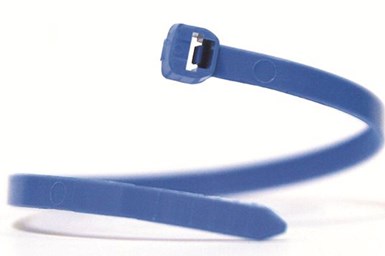Metal-Detectable Nylon 66 Compounds for Cable Ties, Fasteners
Material targets applications where foreign object contamination causes health concerns and reputational damage.
Ascend Performance Materials has announced the launch of pre-colored, metal-detectable Vydyne PA66 compounds for cable ties and fasteners for industries where foreign object contamination causes health concerns and reputational damage, such as in pharmaceutical and food processing facilities.
The new product reportedly meets the most stringent performance standards and simplifies the supply chain for cable tie and fastener producers.
“We constantly look for ways to better serve our customers,” says Tim Goossens, cable tie segment leader for Ascend. “This new metal-detectable Vydyne reduces the need for additional tolling or masterbatch steps and ensures the material performs as intended right out of the box.”
Both the United States and European Union have strict performance requirements for materials used in and around food and drug processing facilities.

Photo: Ascend
Ascend says it ensures the consistent dispersion of the metal additive within the polymer matrix so that even small metal particles are clearly visible and identified with standard detection equipment. In tests with varying sized cable tie fragments added to cereal flakes, even the smallest fragment was reliably detected using X-ray imaging with a micro-focus tube at 60 kV and 0.3 mA.
Metal-detecable Vydyne materials are globally available and offered in two blue-colored grades with high- and low-impact strength. Beyond cable ties and fasteners, both grades also target safety-critical applications in other sensitive market segments, such as machined plastic stock shapes, and any consumables that require HACCP-managed food safety. HACCP is a food safety management system based on Hazard Analysis and Critical Control Points
Related Content
-
Automotive Awards Highlight Emerging Technologies
Annual SPE Automotive event gives nods to several ‘firsts’ as well as sustainability.
-
General Polymers Thermoplastics to Further Expand Distribution Business
NPE2024: Following the company’s recent partnership buyout, new North American geographic territories are in its sight.
-
What's the Allowable Moisture Content in Nylons? It Depends: Part 2
Operating within guidelines from material suppliers can produce levels of polymer degradation. Get around it with better control over either the temperature of the melt or the barrel residence time.




